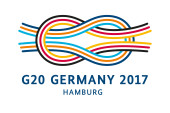German Presidency in 2017
The G20 Presidency 2017 at a glance
Germany assumed the G20 Presidency on 1 December 2016. The G20 is the central forum for international cooperation on financial and economic issues. The G20 countries account for more than four-fifths of gross world product and three-quarters of global trade, and are home to almost two-thirds of the world’s population.
 Logo of the German G20 Presidency
Photo: Bundesregierung
Logo of the German G20 Presidency
Photo: Bundesregierung
The Summit of the Heads of State and Government will be held in Hamburg on 7 and 8 July 2017. Advisers to the heads of state and government, known as sherpas, are preparing for this meeting. In Germany all those involved – including various government ministries report to the G7/G20 Sherpa Staff in the Federal Chancellery. G20 deliberations take place in a confidential setting. The results of the discussions are recorded in a Leaders’ Communiqué, which has considerable political force.
At their annual summits, which have been held since 2008, the G20 heads of state and government traditionally focus on issues relating to global economic growth, international trade and financial market regulation. The G20 finance ministers and central bank governors began meeting regularly in 1999. Other issues of global significance are often closely linked with economic questions. Examples include climate change, development policy, labour market and employment policy, the spread of digital technology and, topically, counter-terrorism. The range of issues now considered by the G20 thus makes for a broad agenda.
Since the global financial crisis, the G20 states have been working to strengthen the resilience of the global financial system and to improve the regulation and supervision of financial market participants, including what is known as the shadow banking system. The aim is to ensure that no financial market, financial market participant or financial product remains unsupervised. Tax payers should never again have to foot the bill for bailing out financial market participants. Banks and other financial services providers therefore now have to hold more equity themselves. This is also a result of the G20 deliberations. Germany in particular has been pushing for measures to tackle harmful tax competition between countries and combat the aggressive tax policies adopted by international firms, and not just since the publication of the "Panama Papers". A package of measures has been adopted, and will now be implemented.
Furthermore, the G20 constantly considers how to achieve strong, sustainable and balanced global economic growth. Ever since the first G20 summit in Washington DC in 2008, trade has also been an item on the permanent agenda of the G20, since growth and employment are dependent on free global trade. The G20 therefore regularly issues clear statements opposing protectionism and supporting fair terms of competition. As issues concerning the spread of digital technology are increasingly affecting economic growth, this topic will receive special attention under the German Presidency. A digital affairs ministers conference will be organised for the first time within the G20 framework.
G20 resolutions can provide key impetus for the conclusion of binding agreements at the United Nations level. Climate policy is the latest example. After the G7 expressed its commitment to adopting an ambitious world climate agreement in order to limit global warming to a maximum of 2°C, the G20 issued a similar signal in support of this goal. The United Nations Climate Change Conference in Paris in December 2015 adopted a legally binding international climate agreement, which is designed to keep global warming significantly below 2°C. Germany adopted its national climate plan before the conference in Marrakesh was over.
The G20 promotes sustainable development and is working in cooperation with African states to create an enabling environment for investment and infrastructure development. The G20 will be resolute in its endeavours to ensure the rapid and comprehensive implementation of the 2030 Agenda for Sustainable Development, with its global goals for sustainable development, and of the Addis Ababa Action Agenda. Germany's G20 Presidency will undertake concrete measures to progress toward this goal and, with this in mind, intends to build on the Action Plan on the 2030 Agenda adopted at the G20 summit in 2016.
The topic of health is also becoming more important for the G20. By way of example, the Ebola crisis resulted in the G20 deciding to devote greater attention to combating dangerous pathogens. Since last year, the issue of antimicrobial resistance has also been on the agenda. In this area work is under way to agree on the appropriate use of antibiotics as well as to coordinate on incentives for improved research and development in this regard.
The G20 also seeks to improve women’s economic empowerment. The G20 thus agreed on the goal of improving labour force participation among women and reducing the gap that still exists in this respect between men and women by 25% by 2025. Germany’s G20 Presidency will build on that and focus on improving the quality of women’s employment. The German G20 Presidency will also work to remove the existing barriers which prevent women from gaining access to information and communications technology in developing countries and to improve education and employment prospects in the field of ICT.
With a view to combating international terrorism, the G20 states have decided among other things to dry up channels of terrorist financing by means of closer cooperation and improved exchange of information. Since 2009, the prevention and suppression of corruption has also been on the G20 agenda. The G20 has since been working consistently to expand its existing body of principles. Under the German Presidency, the focus is on measures to improve public sector integrity and the common search for ways to fight corruption in particularly susceptible areas (e.g. wildlife trafficking).
Wherever possible and meaningful, the German government intends to address the themes it prioritised during its G7 Presidency in 2015 and at the Schloss Elmau Summit in the larger G20 format, picking up for example on the G7 initiatives on sustainable global supply chains, access to renewable energy in Africa, improved international preparedness for public health emergencies and the global fight against antimicrobial resistance.
Germany also wants to use its G20 Presidency to discuss other key global problems, above and beyond the main issues of economic, financial, climate, trade, employment and development policy. Migration and refugee flows and counter-terrorism are, for example, issues of global significance.
In the run up to the G20 summit, numerous meetings of relevant ministers will take place, in which the individual G20 topics will be treated in more depth. To this end, the ministers responsible for finance, foreign affairs, labour, health, agriculture and information technology will meet.
Chancellor Angela Merkel will also meet with civil society representatives. These talks will take various formats and will include the areas of business (Business20), non governmental organisations (Civil20), trade unions (Labour20), science (Science20), think tanks (Think20), women (Women20) and youth (Youth20). The meetings will be the responsibility of the civil society organisations themselves and will focus on relevant G20 topics, on which the organisations will draft recommendations for the Presidency in cooperation with international partners. The civil society dialogue with the German government is intended to provide an opportunity to discuss ideas and recommendations from the stakeholders involved and follow them up where appropriate.

